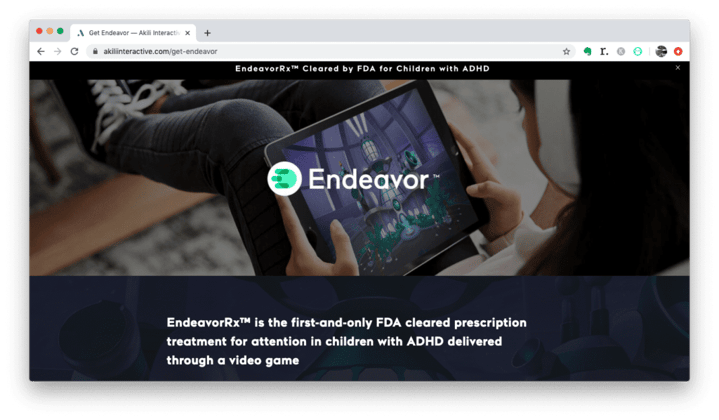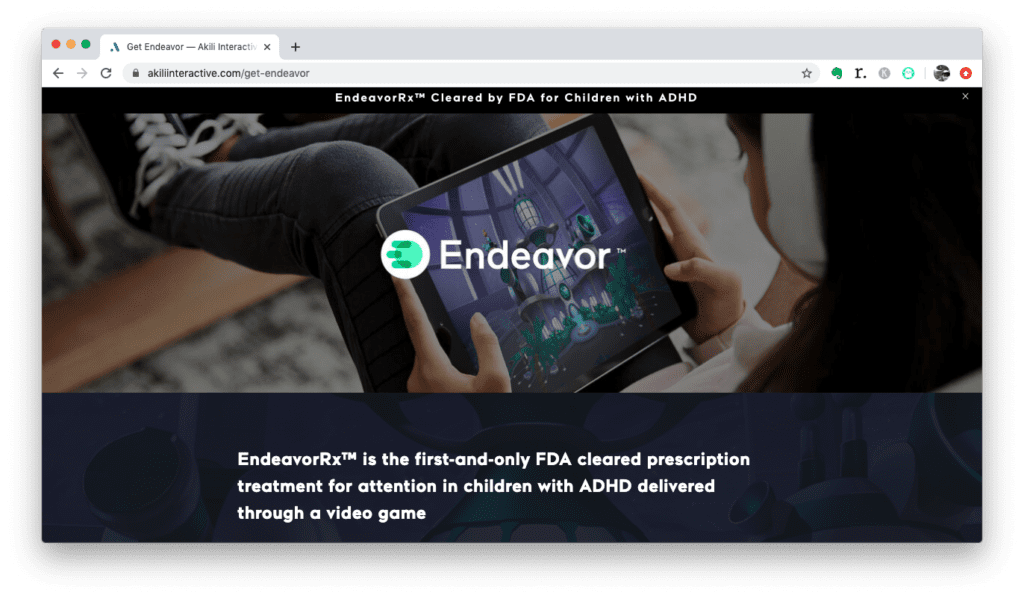nlopchantamang.com
Video Games: Just What the Doctor Ordered?
Ethan Brooks

The Signal: The FDA just approved the first "prescription" video game. EndeavorRX treats ADHD -- a condition that affects 5-11% of kids in the US and Europe -- and was clinically shown to eliminate attention deficits in 30% of test subjects after 4 weeks of use. It is the latest in an emerging field of treatments known as "Prescription Digital Therapeutics" (PDTs).
According to Sean Duffy, whose company Omada Health coined the term PDT, the main difference between PDTs and the apps you can find in the app store is that PDTs undergo rigorous clinical testing.
"That’s why the term ‘digital therapeutic’ was born: to categorize evidence-based, clinically validated, and regulatory-adherent digital interventions in a sea of apps and programs claiming the broad mantle of digital health," he wrote recently.

The Opportunity: To gain FDA approval, EndeavorRX underwent 7 years of clinical trials. However, now that they have paved the way, other similar PDT games will only need to prove "substantial equivalence" rather than documenting completely new clinical evidence. This means that more prescription videogames are likely on the horizon, opening up interesting opportunities, including:
Combatting Over-Prescribed Drugs: The US medical system has an over-prescription problem. Three major drug distributors are negotiating a settlement of $48B for irresponsible over-distribution of opioids, contributing to the deaths of 200k+ people since 1999. Other medications, like SSRIs, are often prescribed for long periods of time, at the risk of the patient, and without adequate evidence of benefit.
However, a growing body of evidence suggests that even simple games like Tetris can alleviate some of the most traumatic symptoms of post-traumatic stress disorder, and the immersive experience of video games may be used to help treat major depressive disorder (MDD), anxiety, and even multiple sclerosis.
The data below shows just how serious and pervasive these challenges are. Offering a safe, affordable treatment that decreases drug dependence for even a portion of these patients can do good while also being big business.

While Akili hasn’t yet set a price for EndeavorRX, a spokesperson for the company told us they expect it to be on par with other prescription treatments for children with ADHD ($75 - $250/month).
PDTs for Physicians: Right now, EndeavorRX is the only FDA-approved prescription video game. But as the field expands, doctors will need help understanding the options.
Most physicians are required to complete Continued Medical Education (CME) each year. According to the ACCME, the accrediting body for CME providers, the industry brought in $1.5B in course registration fees in 2018, with the average accredited CME provider reporting $1.6m in income.
Be on the cutting edge of this new trend by developing the first accredited CME program to teach doctors about prescription games and other PDTs.
The Brain Behind the Curtain: To build a billion-dollar business in this space, focus less on the individual game than on the underlying technology that powers it.
Akili’s Selective Stimulus Management Engine (SSME™), for example, is patented software that uses algorithms to automatically adjust the difficulty of a game based on how well a patient is adapting to it. It enables play-by-play monitoring of patient progress, and continuously challenges each patient, encouraging them to improve.
This kind of "game-brain" could be licensed out to other PDT producers, or creators of innovative digital education platforms. Since it collects crucial data on patient progress, it could also be valuable to treatment providers and concerned parents alike.
Leave a Comment